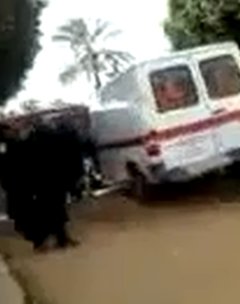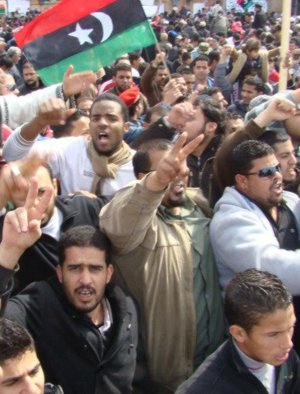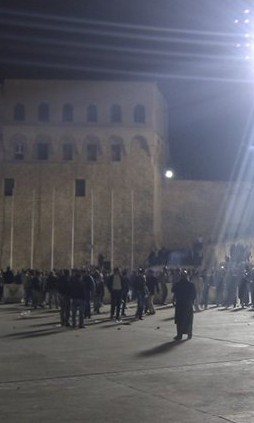|
Libya Politics | Human rights As Tripoli protests fail, civil war starts
Friday is the day of falling dictators in North Africa, history had shown in Tunisia and Egypt. The rebel-held majority of Libya hoped that last Friday or yesterday would lead to massive protests also in Tripoli, putting enough pressure on the Ghaddafi regime to cause its fall.
A civil war was born. In eastern Libya, so far firmly on the rebels' hands, an airborne attack on the oil terminal in Port Brega and its strategic airport by pro-Ghaddafi troops allowed for an attack on the "liberated" town Aljdabiyah. For the first time, the main "liberated city" Benghazi sent troops to the front to help protect and retake this strategic area. From its stronghold in the city of Sirte, the Ghaddafi regime yesterday also launched an attack on the nearby oil town of Ras Lanuf. Fighting has been intensive, with rebel troops from Benghazi coming to the town's rescue. Today, it seems, the rebel troops have consolidated their victory in Ras Lanuf. Rebel troops said they were given vital help from citizens in the town. However, 12 rebels had been killed in this first true civil war battle in Libya. On the eastern front, Sirte may be the next battlefield. Sirte, the birthplace of Colonel Ghaddafi, initially fell to the protesters but was quickly retaken by pro-Ghaddafi troops. Reports from Sirte - also strategically placed on Libya's main east-west route - indicate that rebel troops also here could expect popular support if attacking. The western front, mainly composed of Tripoli and the towns and cities towards the Tunisian border, is more insecure for the reb
In the west, almost all urban areas are on rebel hands, but remain isolated islands in a hinterland dominated by some of the Ghaddafi regime's strongest brigades and militias, provided with supplies from Tripoli. No city or town is secure from attacks from these troops. Today again, the town Al-Zawiya has been constantly attacked by the well-equipped Khamis Brigade, led by Colonel Ghaddafi's youngest son. Al-Zawiya is the town closest to Tripoli under rebel control and has been a constant thorn in the eye of the Ghaddafi regime. Several bloody battles have been fought to retake the town. Today's fighting is described as especially fierce by sources in Al-Zawiya, with the Khamis brigade totally surrounding the town. There are reports of many casualties; some even speak of a massacre. Rebel troops - composed of defected army units and civilians receiving training - have managed to fight back several offensives. The fighting is ongoing. On the western front, the "liberated" towns and cities so far have not had the possibility of uniting their forces. Each urban area has to defend itself - at least until the rebel troops from the east manage to reach this region. The destiny of Libya now will be decided by war, not by revolution. So far, the rebels seem to gain the upper hand but it is totally unclear how long the fighting to remove the Ghaddafi regime will last. By staff writers © afrol News - Create an e-mail alert for Libya news - Create an e-mail alert for Politics news - Create an e-mail alert for Human rights news
On the Afrol News front page now
|
front page
| news
| countries
| archive
| currencies
| news alerts login
| about afrol News
| contact
| advertise
| español
©
afrol News.
Reproducing or buying afrol News' articles.
You can contact us at mail@afrol.com










